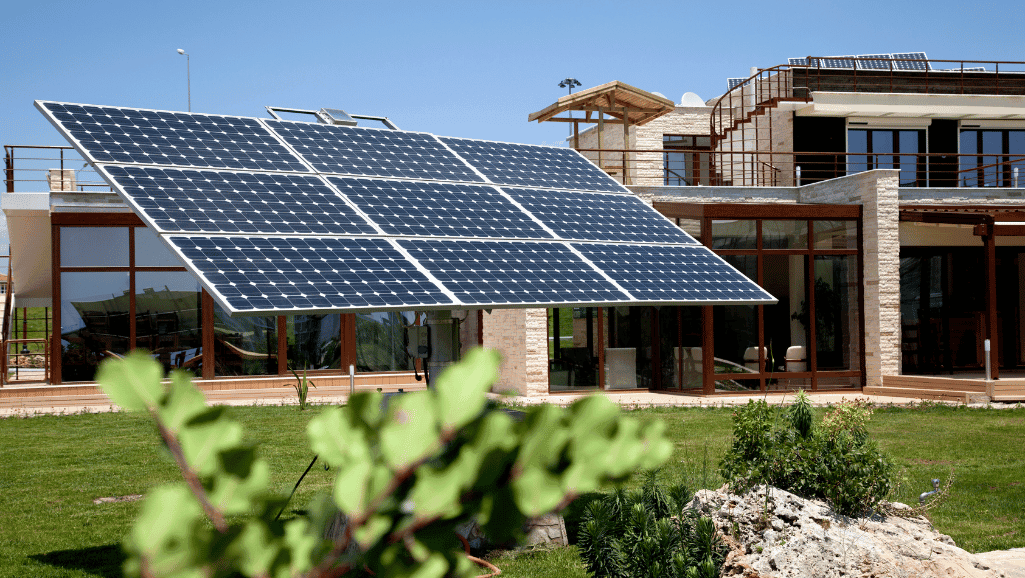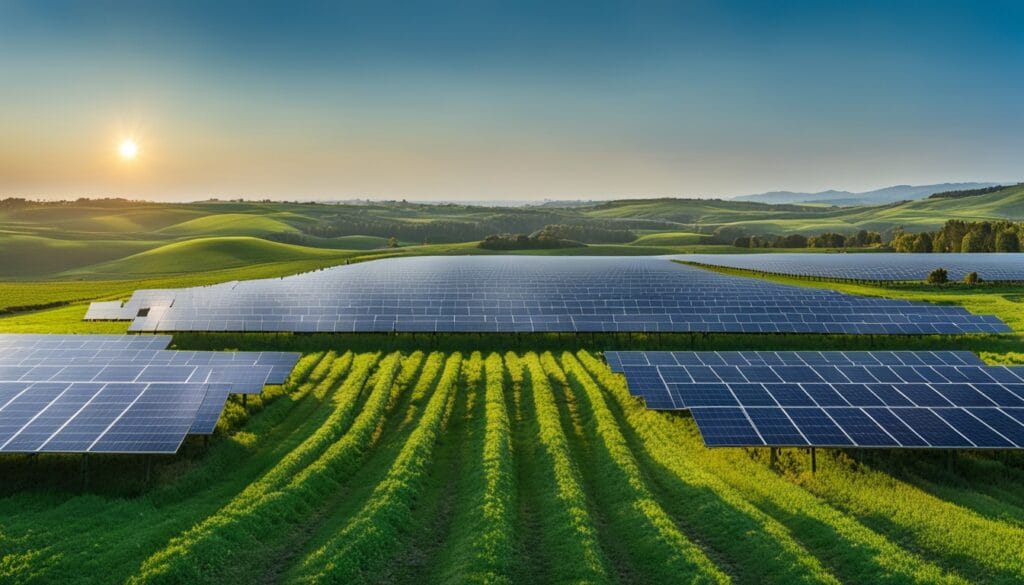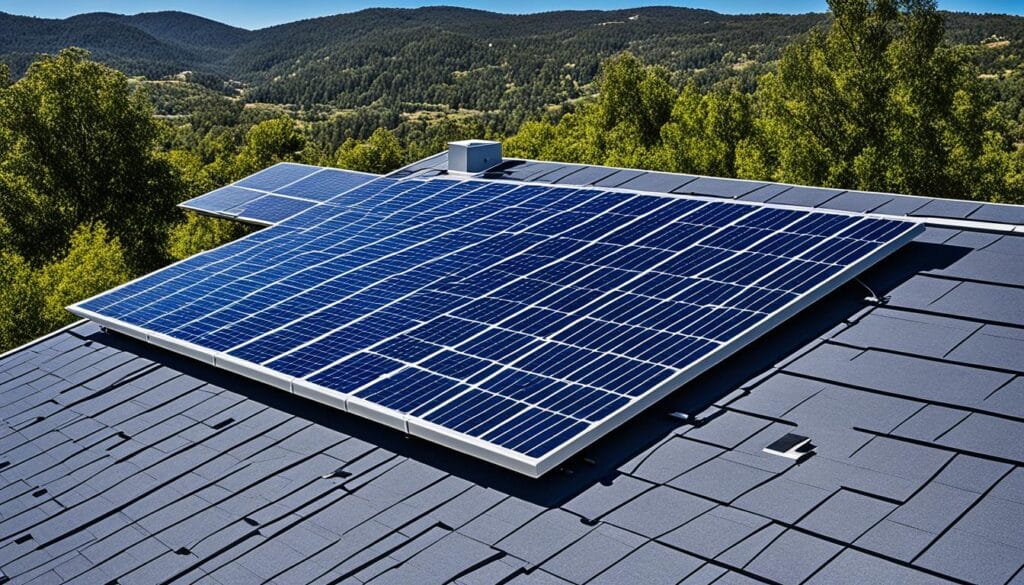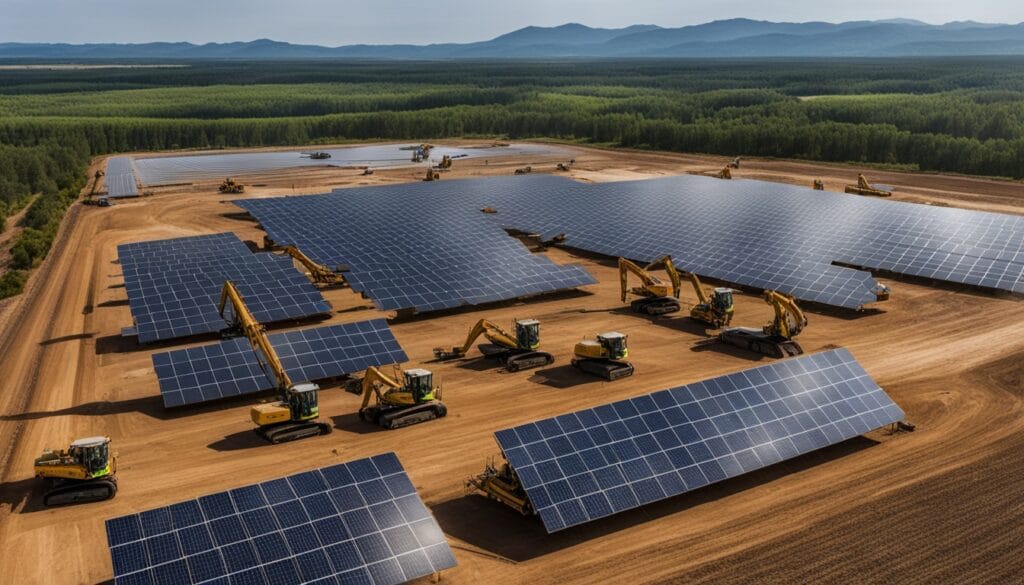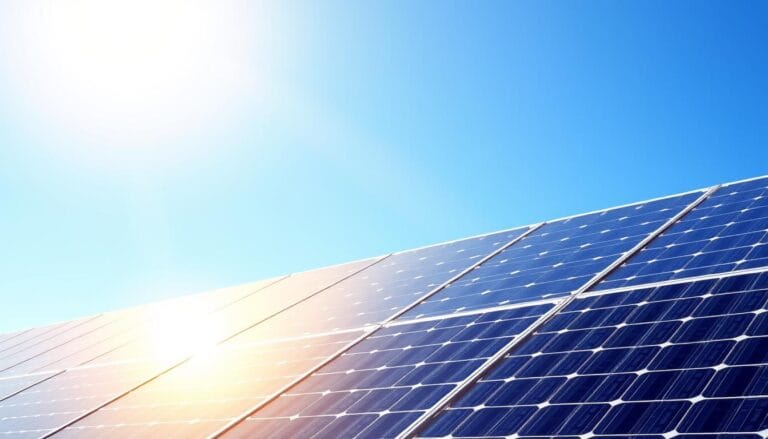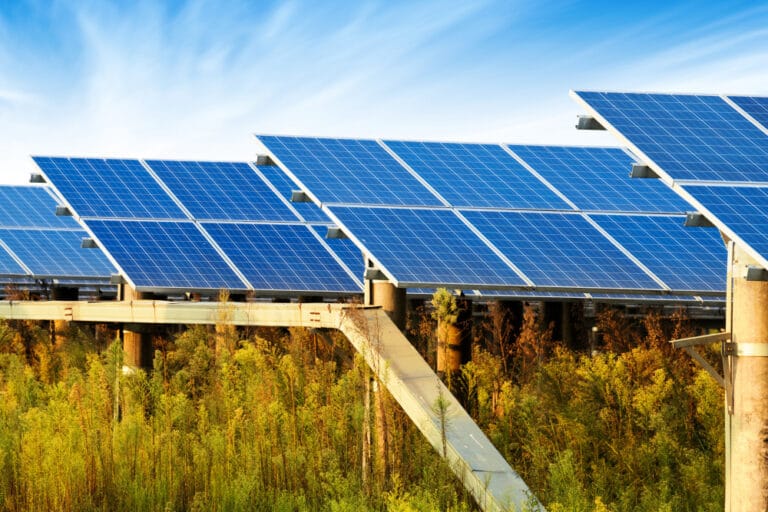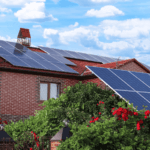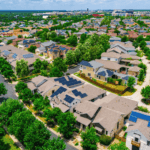The dawn of sustainability beckons as solar energy emerges as a beacon in the quest for a renewable and cleaner future. The benefits of solar energy shine through its ability to fuel our homes, businesses, and lives with minimal environmental impact and significant economic advantages. With solar energy’s inherent abundance and reliability, many are asking, “why choose solar energy?”
Solar energy advantages go beyond its renewable nature; they extend into tangible gains for homeowners and businesses alike. Switching to solar power means unlocking solar energy benefits for home, such as reduced utility costs and a lower carbon footprint. These benefits are complemented by solar energy’s critical role in job creation, increasing property values, and promoting energy independence.
By embracing the sun’s power, society can decrease its reliance on fossil fuels, which currently supply nearly 60% of U.S. energy needs. In its place, solar power offers a clean and inexhaustible energy source. It’s a solution that not only saves water and land but also ensures that every sunrise brings a new promise of sustainable energy. Choose a brighter future; choose solar power. Explore further and become a part of the sustainability revolution, here at Solar Powers World.
Key Takeaways
- Solar power provides an inexhaustible source of renewable energy, curbing dependence on fossil fuels.
- Significant cost savings on electricity bills make solar a smart financial choice for homeowners.
- Greenhouse gas emissions are dramatically reduced, aiding in the fight against climate change.
- The growing solar industry sparks a surge in job creation across manufacturing, installation, and maintenance sectors.
- Increased property values reward homeowners who invest in solar panel installations.
- Advances in solar technology promise enhanced energy independence and grid stability.
Renewable Energy Source: A Sustainable Choice
Today, we’re moving towards sustainable energy sources for our planet’s future. Solar energy is a top choice because it’s powerful and doesn’t harm the environment much.
The Abundance of Solar Power
Solar energy uses the sun’s endless power, making it a key renewable option. It’s a big deal for our planet because it’s always there and won’t run out. Even a small part of the U.S. could greatly increase our solar power, showing its huge potential.
Reducing Reliance on Finite Resources
Using renewable energy helps us use less coal and oil, which are running out. Switching to solar power is good for the planet and our wallets. It’s key for a stable future for both the environment and our economy.
Ensuring Long-Term Energy Availability
Solar panels last more than 25 years, making solar a lasting energy solution. They keep producing energy with little harm to the planet. New tech like lithium ion batteries makes solar even better, helping us use it more efficiently.
As we see more benefits of renewable energy, using solar power every day is becoming easier and more important. Moving to solar energy helps us now and sets a good example for the future. It promises a cleaner, stronger energy system for all of us.
Cost Savings with Solar Energy
More people are using solar technology, which is good for the planet and their wallets. By looking at the long-term financial benefits of solar, people can save money every month. This is thanks to various incentives.
Long-Term Financial Benefits
Putting solar panels on your roof is a smart move that pays off over time. It cuts down on the money you spend on electricity. For example, an 8 kW solar system costs between $16,000 and $30,000.
Over 25-30 years, you could save $25,000 to $110,000 on electricity. This makes solar power a great choice for saving money and being green.
Impacts on Monthly Electricity Bills
One big perk of solar panels is saving money every month on your electric bill. After you pay for the system, you get free energy. This means lower bills.
On average, Americans spend $1,834 a year on electricity. Solar power can cut this cost to almost nothing. Savings vary by state, so check local incentives and sunlight levels.
The Role of Incentives and Tax Credits
Solar energy tax credits and solar energy incentives make solar even more appealing. The government gives a tax credit of 30% of the system’s cost. This was boosted by the Inflation Reduction Act of 2022, lasting until 2034.
States also offer rebates, property tax breaks, and net metering policies. These help lower the upfront cost and speed up when you start saving money. With these incentives, solar power is more affordable and pays off in about 8.5 years.
Solar power is a smart choice for saving money and fighting climate change. It offers lower electricity costs, protection from rising prices, and big incentives. Switching to solar is a wise move for today and tomorrow.
Minimizing Environmental Footprint Through Solar Power
Now more than ever, we need to tackle global environmental issues head-on. Solar power is a key solution. It helps reduce our impact on the planet and moves us towards a sustainable future. Solar energy doesn’t release harmful pollutants, making it a big step towards a cleaner energy source.
Combatting Climate Change with Clean Energy
Solar energy is a clean, endless power source that fights climate change. It turns sunlight into electricity without the harmful gases that cause global warming. Switching to eco-friendly solar solutions is crucial for keeping our planet healthy and full of life.
Switching to solar power in an average U.S. home is like planting 125 trees each year. Or it’s like not burning 8,440 pounds of coal. This greatly reduces our carbon footprint.
Solar Energy’s Role in Reducing Greenhouse Emissions
Solar energy is great for the environment because it cuts down on greenhouse gases. This is seen in places like Germany and Australia, where more solar power means less carbon emissions. Solar energy also uses very little water, unlike traditional power sources that use a lot for cooling.
Using solar power means choosing an energy source that doesn’t emit pollutants. It shows our commitment to living in an eco-friendly way. Solar technology is key for a cleaner, sustainable future. With ongoing support and incentives, solar energy is a big part of our fight against environmental issues.
Advancing Energy Independence with Solar Panels
The push for energy independence is a big deal worldwide, especially in the energy field. Switching to solar power helps communities and countries become more self-sufficient. It also cuts down on the need for expensive and unreliable imported fuels. The benefits of solar panels go beyond just helping the planet. They make communities more independent in how they produce energy and make them less dependent on big, centralized power grids.
Looking at the reasons to switch to solar energy, the top reason is energy security. Countries like Germany and China have really gone for solar power under policies like the Energiewende. This move has greatly reduced their need for natural gas imports and has made their energy systems more eco-friendly. It also gives them more control over their energy use.
By using solar panels, people can shield themselves from the ups and downs of traditional energy prices and availability. They can focus on a clean, sustainable energy source from the sun.
In places like Ta’u Island in American Samoa and remote areas in California, solar panels have brought a new level of independence. They’re cutting down the need for big, costly power lines and encouraging the use of local energy sources. This change is seen in the big increase in solar installations in these areas. It’s helping communities take charge of their energy needs and is setting an example for others around the world.
Solar energy also opens up new job opportunities. The International Renewable Energy Agency predicts the industry will support over 18 million jobs by 2050. This growth is thanks to the need for installing solar systems, maintaining them, and innovating in solar technology.
| Country | Growth in Solar Capacity | Decrease in Energy Imports |
|---|---|---|
| Germany | Significant Increase | Reduced Natural Gas Imports |
| China | World’s Largest Producer | Major Reduction in Energy Imports |
| California, USA | Substantial Growth | N/A |
The reasons to switch to solar energy are many and strong. They include promoting energy independence, protecting the environment, creating jobs, and lowering energy costs. As more regions turn to solar power, a future powered by sustainable, renewable energy looks more and more likely.
Low Maintenance Requirements of Solar Power Systems
Homeowners looking for eco-friendly options should consider solar power systems. They offer many benefits, including low maintenance. These systems are both cost-effective and easy to keep up, making them a smart choice for energy needs.
Looking after solar panels is easy and straightforward. This makes them very appealing. They only need occasional cleaning and regular checks to work well. These simple tasks mean solar power systems are low maintenance, saving homeowners time and money over the years.
The Simplicity of Solar Panel Upkeep
Solar panels last a long time, about 25 to 30 years, with little upkeep. They only need cleaning a few times a year to remove dirt or residue. This keeps them running efficiently and producing energy without needing frequent or expensive repairs.
Cost-Efficiency in Long-Term Maintenance
Maintaining solar power systems is cost-effective. The initial cost to install them is around $18,000 for a whole house. But, the ongoing costs are very low. For example, cleaning and checking them once a year costs about $150, much less than traditional energy systems.
These systems pay for themselves in six to 10 years, thanks to big savings on energy bills.
| Maintenance Aspect | Typical Cost | Frequency |
|---|---|---|
| Annual Cleaning & Inspection | $150 | Annually |
| Inverter Replacement | $500 – $1,000 | 5-10 Years |
| Initial System Cost | $18,000 | One-time |
Solar panels are reliable, thanks to warranties that last up to 20-25 years. This covers most of their life. With their durability and low upkeep, solar panels are a great choice for homeowners wanting to cut down on energy costs and environmental impact.
Job Creation in the Solar Energy Sector
The solar power sector is changing the job market by offering many jobs for different skills. This growth in job creation in renewable energy is boosting employment and adding to the economic benefits of solar power. As solar technology gets better and cheaper, industries and governments are taking advantage of the solar power benefits.
Economic Growth from Solar Industry Jobs
The numbers show how fast the solar sector is growing. For example, the International Renewable Energy Agency says there were about 3.4 million jobs in solar in 2020. In the U.S., solar jobs increased by 66% from 2015 to 2016. This shows a strong growth in job creation in renewable energy.
The National Renewable Energy Laboratory (NREL) found over 242,000 people worked in the U.S. solar industry in 2020. This shows how solar power is helping the economy grow.
In places like India and Germany, more jobs are being created because of solar energy. There’s a big need for skilled workers in areas like making solar panels, installing them, and maintaining them. For instance, Germany’s Energiewende policy has helped solar jobs grow a lot, showing how policies can help renewable energy jobs.
Educational Opportunities and Workforce Development
The solar industry needs a skilled and knowledgeable workforce. Schools and training centers are now offering courses on solar technology and how to install it. This helps meet the need for skilled workers and ensures the solar industry can keep growing.
Education and the growing solar industry work together to bring more benefits. This creates a cycle of growth, learning, and development. It supports a future economy powered by renewable resources.
The solar energy sector is showing it’s not just viable but also leading in sustainable economic growth. With costs going down and policies supporting it, the solar power benefits will reach more people. This sets the stage for a green economy that’s inclusive and thriving.
Benefits of Solar Energy for a Versatile Application
Solar energy is very versatile, making it a great choice for many uses. It’s becoming more popular as a green energy source. Whether for homes or big solar farms, solar power can handle a lot of energy needs.
One big plus of solar energy is saving money. Solar setups can cut down or even wipe out electricity bills. This makes it a smart choice for saving money over time.
But, solar tech can be pricey upfront. Yet, costs have gone down over the years, making solar more affordable. This change shows how tech advances and more people wanting solar have lowered prices.
- Solar energy works on many scales, from homes to big businesses.
- It doesn’t just save on bills; it also helps the planet by cutting down on harmful gases.
- Looking after solar panels is easy, needing just a few cleanings a year.
Yes, solar energy needs the right weather to work well, especially in places that don’t get much sun. But, its good for the planet and your wallet makes it a strong choice. Solar energy is a smart, cost-saving option that helps with jobs and cuts pollution.
Enhancing Grid Stability with Distributed Solar Systems
The need for renewable energy is growing, making the benefits of going solar clear, especially for grid stability. Small solar systems, from 5 to 25 kilowatts, are key in this effort. They save on solar energy costs and make the energy grid more reliable.
These systems produce power locally, cutting down on energy loss and easing the grid’s load during high demand. This local power is vital for steady energy supply and preventing power cuts. By adding solar power to local grids, these systems help balance energy use.
Alleviating Power Outages with Solar Contributions
Distributed solar setups boost grid strength, especially during high demand times. They add power to the grid, easing the load on traditional power plants and lowering the chance of outages. Solar systems also stay up and running during extreme weather, keeping the power on.
Peak Demand Management and Solar Integration
Managing peak demand is key to keeping the grid stable, and solar systems lead in this area. By making power near where it’s used, they lessen the strain on the grid. New PV inverters help solar energy fit smoothly into the grid, keeping voltage and frequency stable.
Improving solar integration also means looking at pricing and rules for connecting to the grid. Sites like the Distributed Generation Interconnection Collaborative offer insights and examples for better decisions on solar connections.
More solar power means a shift to decentralized energy systems. This change saves on solar energy costs and helps with grid stability. It shows the strong benefits of going solar.
Real Estate Advantages of Installing Solar Panels
Looking at the link between solar energy benefits for homes and real estate value shows a strong case for investing in sustainable real estate. Solar technology is good for the planet and also makes properties more attractive and valuable. This makes it a wise choice for homeowners and developers.
Adding solar panels to homes does more than cut down on electricity bills. It also raises the value of the property. The National Renewable Energy Laboratory found that a home’s value can go up by $20 for every dollar saved on electricity each year. This shows how solar power can greatly increase the value of a home.
Gauging the Impact of Solar Energy on Property Values
Zillow’s data shows that homes with solar energy systems sell for up to 4% more than those without. This highlights the growing demand for eco-friendly living. It also points to a move towards more sustainable real estate markets. A study from Berkeley National Laboratory also found strong positive effects on home resale values from solar installations.
Attracting Homebuyers with Sustainable Features
Solar-powered homes appeal to more buyers than those without. This is especially true for people who want to lessen their environmental impact. With the long-term savings from lower utility bills, solar setups are a smart choice for the future.
Boosting solar energy benefits for homes not only increases increased property value. It also moves us towards more resilient and sustainable real estate practices. As we move towards green technology, solar power is key to real estate value. It combines economic gains with caring for the environment.
Conclusion
The landscape of renewable energy is always changing. Solar energy is leading this change. It’s clean and renewable, offering big environmental benefits by cutting down on harmful emissions.
Solar power has many advantages. It boosts energy independence and helps the economy by creating jobs. Homeowners see lower electricity bills and can even increase their property’s value.
Advances in solar energy are tackling its main challenge: being unreliable. New energy storage tech makes solar power steady even when the sun isn’t shining. Solar systems are also cheap to run and maintain, making them a smart choice for saving money over time.
But, solar energy isn’t perfect. It can be expensive to start and needs a lot of space. Yet, new tech is making solar energy cheaper and more efficient. This makes it a key part of fighting global warming and protecting our planet.
As more people turn to solar energy, our energy systems get stronger. This helps us now and for the future. It’s a step towards a sustainable world.



